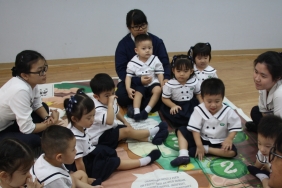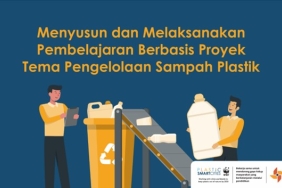COLLABORATING TOGETHER TO REALIZE A SCHOOL WITHOUT PLASTIC WASTE
Jakarta, 10 October 2023 - In an effort to reduce plastic waste that pollutes the ocean up to 8 million tons per year, WWF-Indonesia and the DKI Jakarta Education Office are committed to reducing the use and management of single-use plastics in the Zero Waste School declaration targeting 50 primary and junior high schools as pilots. This commitment is supported by the Indonesian National Commission for UNESCO (KNIU).
WWF-Indonesia through the Plastic Smart Cities (PSC) program is committed to supporting collaborative efforts in waste management in DKI Jakarta Province, especially schools that have an important role in educating the younger generation to care more about the environment and change behavior to sort waste from its source.
Based on data from the Ministry of Environment and Forestry's SIPSN, the total waste generation in Indonesia in 2022 will reach 21 million tons (https://sipsn.menlhk.go.id/sipsn/). It is estimated that between 4.8-12.7 Mt of plastic accumulates in the ocean each year (Jambeck et al., 2015), and about 60% of plastic waste polluting the ocean comes from cities.
Plastic Smart Cities is an initiative launched by WWF-Indonesia with a mission to encourage cities and coastal centers to stop the leakage of plastic waste into nature by 2030 by working with stakeholders around the world.
Irfan Bakhtiar, Director of Climate & Market Transformation, WWF-Indonesia said, "Currently we know that waste, especially plastic waste, is often unmanaged and only disposed of in landfills, even polluting the environment, both land, water and air. We need to find a wiser and more effective way to reduce the adverse effects of plastic waste by educating the current generation to start sorting waste from its source and managing plastic waste properly." Irfan continued, "Schools are the right institution to shape behavioral changes for students in forming characters who care about the earth, because this is their only home".
DKI Jakarta's community activities produce waste reaching 590,000 tons in 2022, and this has not been separated between organic and non-organic including plastic. For this reason, education is needed to reduce and sort waste, especially in schools.
The Acting Head of DKI Jakarta Education Agency, Purwosusilo, M.Pd said, We really appreciate positively to WWF-Indonesia for the implementation of this Zero Waste School program which certainly brings great benefits. The Education Office of the DKI Jakarta Provincial Government, in this case the DKI Jakarta Provincial Government has a Jakarta Waste Awareness program. And the DKI Jakarta Provincial Education Office supports the program, one of which is through the Environmental Care and Culture Movement in Schools (GPBPLHS). This is in line with the WWF Indonesia Foundation in carrying out educational activities to schools towards waste reduction through the Plastic Smart Cities program through 30 elementary schools and 20 junior high schools.
On the same occasion, the National Commission for UNESCO also supported the development of education, especially basic education, which is currently the focus of WWF-Indonesia Plastic Smart Cities program and the DKI Jakarta Education Office through Zero Waste School activities.
Itje Chodijah, Daily Chairperson of the Indonesian National Commission for UNESCO said, "Behavior change is the most important thing for schools to target to form school students who care about the environment. The word care is also followed by the actions of the students to actively participate in reducing, and sorting plastic waste, especially single-use plastics. This activity is also an implementation of the Green Education for Sustainable Development program that we are promoting to support the achievement of Indonesia's Sustainable Development Goal (SDG)".
The Indonesian National Commission for UNESCO (KNIU) is an institution in charge of launching efforts and coordinating activities in the fields of education, science, culture and communication in the framework of Government programs and UNESCO Programs.
Through this declaration, WWF-Indonesia and the DKI Jakarta Education Office, together with 50 selected schools, are committed to creating positive changes in overcoming the plastic waste problem through education, behavior change, and cooperation between schools. Hopefully this declaration will be a big step towards greener and more environmentally friendly schools.
- END -
For more information, please contact:
Karina Lestiarsi, Communication Officer
klestiarsi@wwf.id |+62-852-181-616-83





